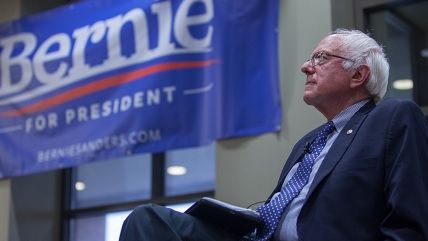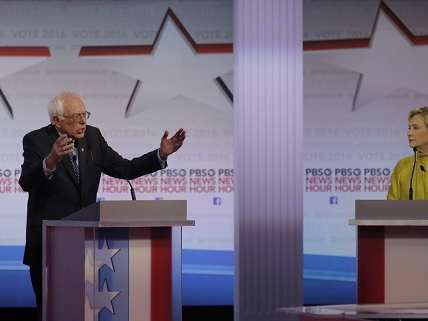Bernie Sanders Says He Understands There Are Unintended Consequences in Foreign Policy. Does He?
Confused about role of trade in improving relations, open to being a world policeman.


Bernie Sanders finally found his spine on foreign policy, engaging Hillary Clinton on her consistent support for regime change and her embrace of war criminals of the American foreign policy establishment like Henry Kissinger, former secretary of state under Richard Nixon and Gerald Ford.
The foreign policy portion of last night's debate started the way such portions of the debate usually do on both sides—by pointing out how much worse the other side is. That strategy works to limit introspection on U.S. foreign policy and to take attention away from the flaws and vagueness of the candidates' own foreign policy platforms.
After providing the boilerplate answer about ISIS (the U.S. should lead a coalition against it, recruit fighters on the ground, and also use the terrorist group as a pretext for increasing controls on the Internet), Hillary Clinton pivoted to the post-9/11 "do something, say something" campaign in New York City, claiming the use of civilians as part time human intelligence in the homeland was an important counter-terrorism strategy, and that information from Muslims, in particular, was useful. That was the opening to turn the conversation to Donald Trump, who she claimed "insults" their religion.
Sanders didn't follow up on the Trump bash, instead turning the debate toward judgement. "What a president of the United States has got to do, Sanders began, "is to, A, make certain that we keep our people safe."
This, of course, is the ill-informed conceit out of which many of the worst policies in the war on terror come from. Mass surveillance, infiltration of American Muslim communities, extrajudicial killings, unauthorized wars, and indefinite detentions all flow out of the idea that the president's first job is to keep people safe. The policies would be untenable if the president's job was rightly understood as keeping Americans free.
Nevertheless, Sanders was able to maintain a relatively substantive critique of Clinton's foreign policy. He pointed out that Clinton's actions as secretary of state in supporting the U.S. intervention in Libya led to the power vacuum in which ISIS and other terrorist groups now operate, promising that if he were president he would "look very carefully about unintended consequences." (Clinton pointed out that Sanders, too, had been a supporter of regime change before—referring to a yes vote on the Iraq Liberation Act of 1998.)
But it's not just Sanders' inability to consider the unintended consequences of his economic policies that ought to draw skepticism to that promise. Later on in his answer, Sanders adopted the same blind spots on unintended consequences as the rest of the American foreign policy establishment, endorsing an increase of troop levels in NATO countries adjacent to the Russian borderlands in response to Russia's aggressive actions in "Crimea and in Ukraine." Here a reflection on unintended consequences on how U.S.-Russia relations arrived at where they are was absent.
It got worse when Sanders, a supporter of the nuclear deal with Iran, turned his attention to that country. While he mentioned the 1953 overthrow of Iranian prime minister Mohammed Mossadegh as one of the main factors contributing to the 1979 Islamic revolution, there was no reflection on how U.S. policy toward Iran today might also benefit hardliners the most.
Sanders expressed his wish that one day the U.S. and Iran could normalize relations, and that being "aggressive" about Iran's role in supporting "international terrorism" was critical to that. The channeling of Ron Paul (who mentioned Mossadegh a number of times in the 2008 and 2012 Republican primary debates), then, was momentary. Major unintended consequences result from the U.S. trying to act like the policeman of the world. That's what unilaterally taking on the responsibility of deciding what is international terrorism and what the response should be effectively is. Understanding that unintended consequences are real is important, but not sufficient in limiting those consequences. Many Democrats have been sold on the idea that Republican foreign policy is "blood thirsty." Rhetoric about making sand glow doesn't help. But underneath that surface, the key foreign policy principles on both sides are the same, and involve keeping the U.S. at a default interventionist setting for all the world's problems.
Unsurprisingly, Sanders also missed the role of free trade in improving situations in foreign countries, thus creating the space for improving relations. While he rightly attacked Henry Kissinger for his role in the Vietnam conflict, including its expansion into Cambodia, he also criticized Kissinger for beginning the process of normalizing relations with China, "the terrible, authoritarian, Communist dictatorship [Kissinger] warned us about" during the Vietnam war.
Yet Richard Nixon's trip to China was instrumental in encouraging the country to "join the international community." Nixon met with Mao Zedong, the Chinese dictator responsible for millions of deaths. The path over the next forty years was not straight, but the opportunity for more trade with the rest of the world did open China up, lifting millions of people out of poverty and helping to create a real middle class in China, one whose rise has driven a lot of the global economy this century. For Sanders, (like for Donald Trump) trade is a zero sum game. China wins, the U.S. loses. But what happened to China since Nixon's trip and, for that matter, what happened in Vietnam after the U.S. ended the war and eventually moved toward normalizing relations illustrates the power of trade to benefit all. Americans are better off than they were in the 1970s, and so are people in China and Vietnam. Friendly trade was a far more effective liberator than wars could be.


Show Comments (88)